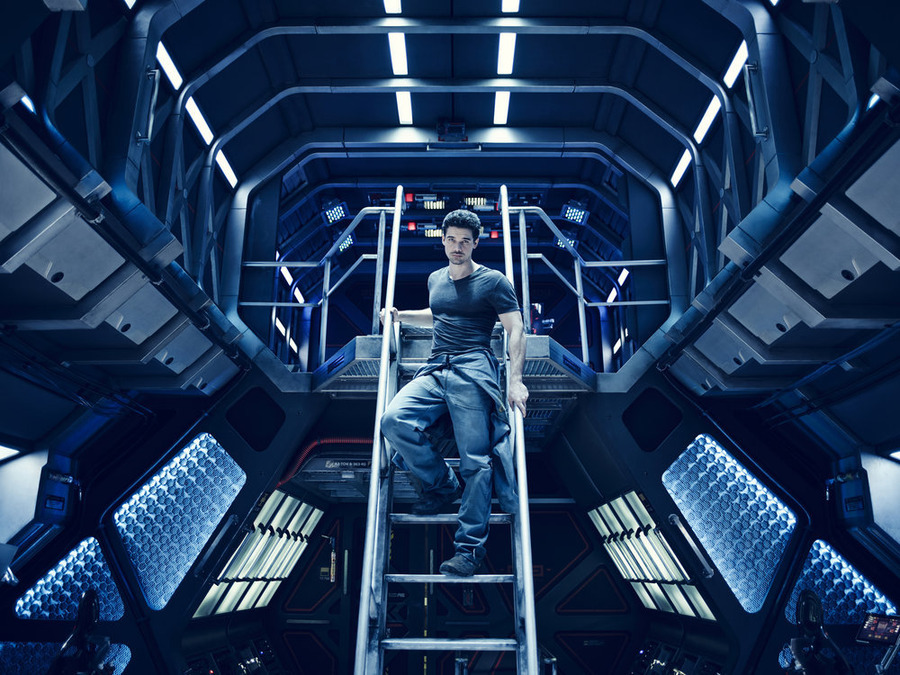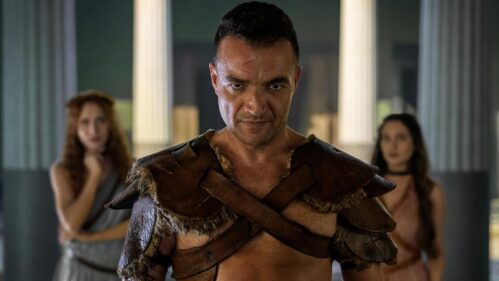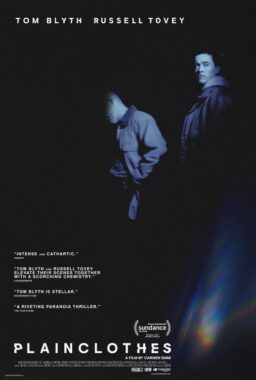Science fiction has always been a genre designed to comment
on current issues through its visions of the future. What films like “2001: A
Space Odyssey” or “Blade Runner” say about today is as essential as what they
say about tomorrow. And so it’s not surprising that SyFy’s two new offerings,
two of the biggest programs in the network’s history, serve as commentaries on
modern politics, religion, and basic human need. What is somewhat surprising is
the wide chasm between the two programs in terms of quality. While one is
refined and complex, the other is the kind of basic cable offering that modern
audiences just don’t want to see anymore. Remember the years before FX and AMC
redefined expectations from cable TV outside of HBO? Remember what “cable
mini-series” meant then? You have some idea of the wooden dialogue, weak production
values and all around failure of “Childhood’s End.” On the other end of the spectrum,
if you’re old enough to remember when “Battlestar Galactica” was rebooted on
the then-called Sci-Fi Channel to rave reviews, then you might see some of that
DNA in “The Expanse,” the most ambitious show the network has produced since “BSG”
went off the air. In any genre and in any future, you win some and you lose
some.
Let’s start with the positive: “The Expanse,” debuting on
Monday, December 14th on SyFy in a two-night premiere and then
airing on Tuesdays for the next eight weeks. Unlike SO much of what the network that has become known for “Sharknado” has offered lately, “The Expanse” actually
challenges audience intellect, forcing them to follow disparate subplots,
multiple characters and thematic intentions. Based on the bestselling books by
James S. A. Corey, “The Expanse” is set two hundred years in the future.
Mankind will apparently reinvest in its space exploration program shortly
because, in just two centuries, we’ve colonized part of the solar system.
People not only live on Mars, the government there doesn’t exactly get along
with the one on Earth. Caught in the middle are the Belters, those born and
living on space stations in the asteroid belts.
One of those societies floating through space is known as
the Ceres, and that’s where we meet a Decker-style detective named Joe Miller
(Thomas Jane). The people of this space station are struggling. They’re clearly
designed to remind us of parts of the world not considered a superpower but
essentially ruled by them. Water and air are not under control of the people.
Imagine a society in which things as basic as oxygen and H2O were manipulated
by others. Naturally, it breeds a sense of revolution. People are protesting in
the street when Miller gets the case of his life. A woman is missing and he’s
asked to find her. It starts that simple. Doesn’t it always start that simple?
While the Miller arc feels like noir, the other half of “The
Expanse” is more directly reminiscent of “BSG.” In this future, blue collar men
and women work on ice freighters, mining ice/water from asteroids to keep the
humans floating through the solar system alive. One such freighter is called
the Canterbury, and its Executive Officer seems like one of the few decent men
still alive, a gent named Jim Holden (Steven Strait), who will become a very
unlikely moral compass for this future. Shohreh Aghdashloo (“House of Sand and
Fog”) co-stars along with a well-assembled ensemble that includes Paulo
Costanzo, Jay Hernandez and the amazing Jonathan Banks of “Breaking Bad” and “Better
Call Saul.”
One successful elment of “The Expanse” that’s so
often missing from bad sci-fi is a sense that this world is lived-in and not
merely a set. Jane conveys that well with his world-weariness and noir
characterization. He, pardon the obvious pun, brings the gravity. There’s some
goofy dialogue that holds it back, but I like that it doesn’t hold your hand in
terms of its narrative or themes. I’m curious to see where it goes.
The same cannot be said for “Childhood’s End,” a three-night
mini-series (12/14-16) based on Arthur C. Clarke’s landmark novel, which has
been close to being adapted for decades, including once by Stanley Kubrick.
Clarke’s book is a stunning examination of how individuality and control
matters to humanity and how perceived utopia can be misleading. Syfy’s
adaptation plays with Clarke’s plot and themes but does so in such a leaden,
DOA way that it’s almost like a grade-school paper from someone who didn’t read
the assignment.
In 2016, Earth is invaded by an alien race that promises
perfection. Spaceships hover over major cities, as people are visited by dead
loved ones who speak for this alien race’s leader, Karellen (Charles Dance).
They’ve come to help mankind, and will eliminate war, famine, inequality, daily
fantasy football leagues—you name it. Groups form to try to push back against
the alien invaders, but most people embrace their new overlords. They even stop
the violence in the Middle East and solve the world’s dependence on oil. They
choose a handsome farmer (Mike Vogel) as their envoy, speaking with him to send
messages to the populous. The nagging question of the first night is why won’t
Karellen let anyone see what he looks like?
The idea that “people get angry when they feel impotent” is
a fascinating one. Would we embrace world peace if it took away our sense of
control? Again, the political context is ripe for exploration. “Childhood’s End”
doesn’t really explore much of anything. It is one of those mini-series that
completely lacks urgency. The first night could have been 30 minutes of a
feature film. Everything is padded, which means we get themes and plot points repeated
over and over and over again. I’ll embrace alien overlords who stop padded
cable mini-series stretched to the breaking point. Just let me know how to get
in touch with them.














